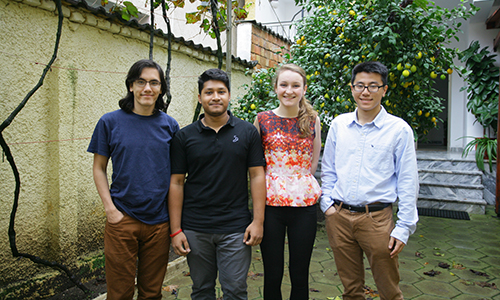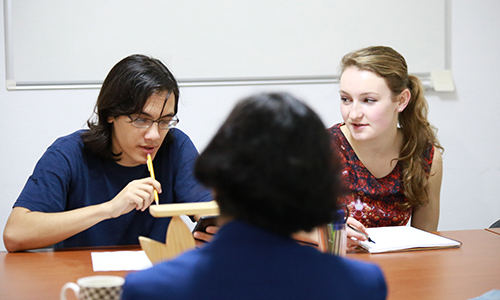Entrepreneurship Project

WPI Albania Project Center: Mapping Albania’s Entrepreneurial Ecosystem
Student project aims to create support system for aspiring entrepreneurs

A student team photo outside the sponsor office
The small country of Albania is known for its soaring mountains, hospitable culture, and colorful cities. If a team of WPI undergraduates has anything to say about it, the nation may one day also be known for something else: a booming entrepreneurial climate.
The students, robotics engineering major Christopher Cormier, biomedical engineering major Bridget Rinkel, mechanical engineering major Shamsur Rahman Saikat, and chemical engineering major James Zheng, spent seven weeks investigating the entrepreneurial ecosystem in Albania as part of their Interactive Qualifying Project (IQP)—a project that requires teams to delve into a problem that matters to real people—undertaken at WPI’s Albania Project Center.
The project was sponsored by the Albanian office of Yunus Social Business, a nonprofit venture fund that supports the development and growth of socially focused start-up companies. Arunima Singh, Partnership & Business Development Manager for Yunus Albania, says that the organization has been working to promote entrepreneurship as a tool for economic growth in Albania for several years and saw an opportunity to build a stronger foundation with the help of WPI students.
"This project was needed because this country needs a push into entrepreneurship," says Singh. "There are too many barriers for people to jump when they want to be entrepreneurs, and we would like to remove as many as we can with this project."
- Arunima Singh, Project Sponsor

A team meeting at the sponsor's office, YUNUS Social Business
As part of their preparatory work before traveling to Albania, the students learned about common methods of mapping entrepreneurial ecosystems to represent the people, organizations, and processes involved in creating a sustainable system. They also created a list of entrepreneurs and organizations they hoped to interview.
Singh says she was particularly impressed with how the students went about reaching out to potential interview subjects once they arrived.
“At Yunus we are so involved with our protocols and ways of doings things that we don’t always think about implementing them in a simpler way,” she says. “For this project, we had this list of entrepreneurs and organizations with email addresses, and the students said, ‘but we found them on Facebook, why can’t we just send them a message?’"
“It actually worked," she adds, "and it had a much faster response than emails.”
In total, the students interviewed 14 entrepreneurs with businesses at different stages of development. They kept the interviews semi-structured in order to capture each participant’s experiences and insights into Albania’s overall entrepreneurial climate.
“We tried to find out how these people perceive entrepreneurship," says Saikat, "and what their approaches are to setting up their businesses, as well as how they perceive their risks to start a business and what organizations they contact to get help, financial or otherwise.”
The students also spoke with representatives from organizations that seek to support entrepreneurs in Albania, including groups from local universities and international communities like Silicon Valley–based Startup Grind.
They note that through the interviews it was immediately apparent how enthusiastic everyone was about creating new economic ventures, a sentiment that hit close to home.
"The people we spoke to have a passion for entrepreneurship, business, and just learning in general, which is very similar to what I'm used to back at WPI," says Rinkel. "It was very inspiring to see that in this developing city everyone is striving and working toward something."
- Bridget Rinkel, Junior
Despite such eagerness to succeed, the team discovered there is significant lack of collaboration between entrepreneurs and organizations throughout Albania.
“There is a gap in the ecosystem," says Saikat. "A lot of entrepreneurs are working on their own. They don’t know how to seek out information on topics like financial investment or legal advice.”
Additionally, many of the entrepreneurs the team spoke with reported that they had difficulty finding qualified employees, were confused about tax laws for start-up businesses, and relied primarily on online resources for marketing and business advice.
On the other hand, the team learned that organizations actually offer a rich variety of resources and services for entrepreneurs, including competitions, mentorship programs, workshops, and co-working spaces. Many also promote entrepreneurship within the community by running educational programs for students and working with the government to create policies favorable to start-up businesses.

A meeting with the sponsor, Arunima Singh at her office
To help bring all this information to light, the students created a model that categorizes services offered by organizations based on activity types and relevant steps that entrepreneurs take in developing their businesses. These include five overarching domains: mentorship/training, financing, networking, support system, and inspiration.
The students took their model a step further by using it to create a demo website from which entrepreneurs can find out about resources available across the five domains. Singh hopes to hire coders to develop the site further and launch the final product sometime later this year.
The collection of resources on the site will no doubt be extremely valuable for entrepreneurs, but both Singh and the students hope the site will serve a larger purpose.
“Hopefully this project will be able to give the entrepreneurs somewhat of a network that will affect them in a positive way," says Zheng, "and help them grow that so there are more interactions between them and possibly an entrepreneurship community.”
Singh adds, "We believe this project will really help entrepreneurs get started, and also give them the recognition they need. We're not Silicon Valley—people don't talk about us, venture capitalists don't want to come to this country. Having something that is easily available online is a fantastic way of sharing and talking about what's happening in the entrepreneurship ecosystem of Albania."
Photo at top of page by Jason Bruno, one of the students who completed his project in Albania.